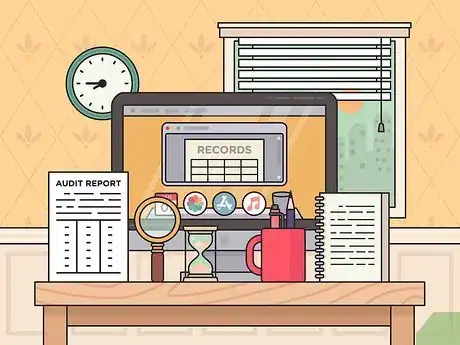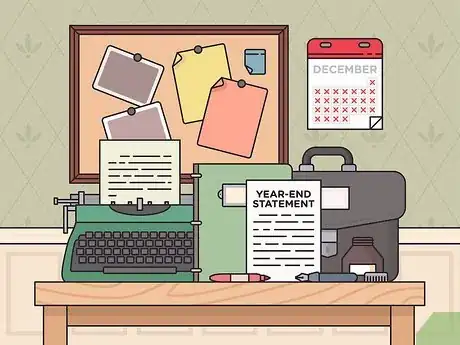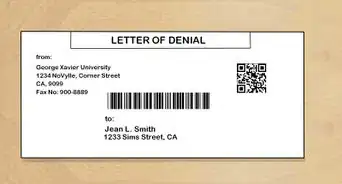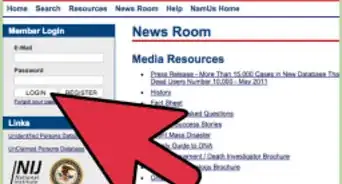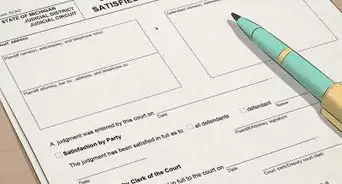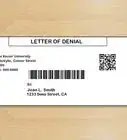This article was written by Jennifer Mueller, JD. Jennifer Mueller is an in-house legal expert at wikiHow. Jennifer reviews, fact-checks, and evaluates wikiHow's legal content to ensure thoroughness and accuracy. She received her JD from Indiana University Maurer School of Law in 2006.
This article has been viewed 7,746 times.
Every year, many organizations, including nonprofits and for-profit corporations, get ready for an independent audit of their financial records. While the prospect of an audit can be daunting and stressful, careful planning can make the process easier to manage. If you review your books before the audit, you might be able to pick up on issues and fix them before the auditor comes. Beyond that, maintaining clear communication with your auditor will help ensure that the audit runs smoothly.[1]
Steps
Organizing Documents and Staff
-
1Hold a meeting with staff who will be working on the audit. Soon after the end of the year, gather finance staff and others who will potentially be involved with the audit. At this meeting, go over the documents that will be needed for the audit and come up with a timeline for producing them.[2]
- If you have a larger organization, you might want to divide up the documents and put different staff members in charge of each category so the documents can be prepared more efficiently.
- Determine which staff members will need to be ready and available to talk with the auditor when they start doing their fieldwork. Your auditor may have a list of specific staff members they want to interview as part of the audit process.
-
2Designate a single staff member to act as the audit point person. It's most efficient to have a single point person who works directly with the auditor, so the auditor always knows who to direct their questions to. That point person can then delegate as necessary to get the auditor's questions answered or produce the documents they need.[3]
- The point person will also be in charge of the logistics of the auditor's fieldwork visit. They'll talk to the auditor to find out what sort of resources the auditor will need so those can be arranged ahead of time. For example, the auditor might need a private room to work in with WiFi available.
Advertisement -
3Gather all requested documents in a single location. Your auditor will provide you with a list of documents they'll need to conduct the audit. Start gathering digital and paper copies of these documents in the room where the auditor will be doing their work.[4]
- In addition to financial documents, you'll also need corporate and organizational documents, board or committee meeting minutes, insurance policies, and all contracts or agreements your organization is committed to.
- Digital copies of documents are often easier for an auditor to work with because they can search them for the information they need. Create a single digital folder for audit documents and organize everything in there by the categories the auditor uses.
Tip: Order the requested documents in the same order as on the auditor's list so the auditor can easily find what they need.
-
4Coordinate staff and records with the auditor before fieldwork begins. The day before the audit, meet with the auditor either on the phone or in-person and walk through the fieldwork plans. Let them know where all the records are that they'll need and which staff members are responsible for which parts of your operations.[5]
- Give your auditor contact information for all the staff members who will potentially be involved with the audit.
- The auditor may have additional records or other information that weren't included on the initial list. Go over what you've prepared so far and ask the auditor if they need anything else to start the audit.
Conducting a Self-Review
-
1Review issues that were raised in prior audits. If you have previous audit reports, look over them and evaluate the areas where you had problems come up in the past. Figure out if those problems have been resolved or if you still have work to do.[6]
- Write up a summary of the response to the previous year's audit and what you've done to clean up the issues mentioned by the auditor. If an issue is ongoing, let the auditor know from the outset so they know that you have been working on a solution.
-
2Prepare year-end reconciliation and financial statements. Reconcile all of your bank accounts and make sure the reconciliation reports and financial statements balance. If you notice any errors or discrepancies, you'll have time to correct them before the audit.[7]
- Make sure your bank reconciliation statement includes a complete list of outstanding checks with the check number, date, and amount, as well as the details of any deposits that have been made but not yet cleared. These are things commonly reviewed by auditors.
Tip: Keeping your accounts reconciled throughout the year can cut down on the time it takes to prepare for the audit.
-
3Check year-end closing reports to make sure they balance. Review all of your accounting schedules and year-end reports. The closing entries should agree with the trial balance. If not, you have some additional work to do before the audit begins to figure out where the problem is.[8]
- List all accrued expenses and document the liability created by any accrued but unused leave, including paid leave that rolls over to the next calendar year.
-
4Update the notes on your financial statements as necessary. The explanatory notes discuss items included in your financial statements. After producing new statements for the year, check the notes and make sure they still comply with the information in the statements.[9]
- If any subsequent events have happened since the end of the year that might have an impact on the information in your financial statements, make sure they're included in the notes.
- Include any contingencies that might impact the information in your financial statements if they happen. For example, if your organization is involved in a lawsuit, that would be included in your notes as a contingency.
Communicating with Your Auditor
-
1Sign a written agreement specifying the terms and conditions of the audit. This agreement, sometimes called an "engagement letter," sets forth the scope of the audit and lets you know how much it will cost. The agreement should also include a clause stating that any increases in fees or extensions of time will be discussed with you beforehand.[10]
- The letter typically also lays out what your staff will be responsible for and what documents you are supposed to prepare and have ready for the auditor before the first day of fieldwork.
- If there is anything in the agreement that you don't understand or don't agree with, discuss it with the auditor before you sign.
- Annual audits can be a significant expense. The total cost typically is based on the size of your organization.
Tip: Try to secure the same auditor every year so that they acquire a familiarity with your organization. This can help keep costs low.
-
2Ask for a list of required documents several weeks before the audit. Typically, your auditor will give you a list of required documents when you sign the engagement letter. If not, make sure you have one in enough time to get all the documents and reports together.[11]
- The documents needed are usually the same from year to year, so if you have a list from a previous year, you can get started early by gathering the documents on that list. Just remember to compare the new list your auditor gives you for any documents or reports that have been added.
Tip: Find out what format the auditor wants your documents in. You'll save time if you can convert documents ahead of time and present them in the right format.
-
3Seek clarification about unusual transactions before the audit starts. If you have any transactions that differ from the norm for your organization, ask the auditor about them before the audit starts. Auditors are usually happy to answer questions about these, and you can ensure that you have the information the auditor needs so they can complete the audit efficiently.[12]
- Ask the auditor about any changes in laws that govern the audit or other changes that have been made since the previous year so you can adjust your documents and records accordingly.
- If you bring up unusual transactions or potential issues to the auditor in advance, they'll know what to expect and you won't have to take up time during the fieldwork to explain them.
-
4Avoid scheduling time off during and immediately after the audit. When the auditor begins their fieldwork, all staff members the auditor might need to talk to need to be available. If someone needs time off for a reason outside of their control, make sure another staff member is briefed on the information they were responsible for and can work with the auditor in their place.[13]
- Additionally, make sure that your board members or finance executives are either present or available to answer the auditor's questions both during and after their fieldwork.
-
5Invite the auditor to attend board or committee meetings. If you have board or committee meetings scheduled between the time that you sign the engagement letter and the time the auditor has scheduled their fieldwork, allow the auditor to sit in. This will give them some additional familiarity with your organization and the people they'll be working with in advance of their fieldwork.[14]
- It also helps the auditor to understand how you're preparing for the audit and introduces them to potential issues that might arise during the audit so they can plan for those as well.
- Having the auditor attend board or committee meetings is especially important if you've hired a new auditor who you've never worked with before.
References
- ↑ https://www.councilofnonprofits.org/nonprofit-audit-guide/preparing-for-audit
- ↑ https://www.councilofnonprofits.org/nonprofit-audit-guide/preparing-for-audit
- ↑ https://www.lla.la.gov/lagag.nsf/bdcb79123307274c8625813000748590/a692bd7c06055dd7862580d4006b2413?OpenDocument
- ↑ https://www.councilofnonprofits.org/sites/default/files/documents/Getting%20Ready%20for%20the%20Audit%20Checklist_0.pdf
- ↑ https://www.lla.la.gov/lagag.nsf/bdcb79123307274c8625813000748590/a692bd7c06055dd7862580d4006b2413?OpenDocument
- ↑ https://www.aicpa.org/interestareas/notforprofit/resources/governancemanagement/ten-steps-to-a-smooth-audit.html
- ↑ https://www.councilofnonprofits.org/nonprofit-audit-guide/preparing-for-field-work
- ↑ https://www.aicpa.org/interestareas/notforprofit/resources/governancemanagement/ten-steps-to-a-smooth-audit.html
- ↑ https://www.aicpa.org/interestareas/notforprofit/resources/governancemanagement/ten-steps-to-a-smooth-audit.html
- ↑ https://www.lla.la.gov/lagag.nsf/bdcb79123307274c8625813000748590/a692bd7c06055dd7862580d4006b2413?OpenDocument
- ↑ https://www.councilofnonprofits.org/nonprofit-audit-guide/preparing-for-audit
- ↑ https://www.aicpa.org/interestareas/notforprofit/resources/governancemanagement/ten-steps-to-a-smooth-audit.html
- ↑ https://www.aicpa.org/interestareas/notforprofit/resources/governancemanagement/ten-steps-to-a-smooth-audit.html
- ↑ https://www.aicpa.org/interestareas/notforprofit/resources/governancemanagement/ten-steps-to-a-smooth-audit.html
- ↑ https://www.lla.la.gov/lagag.nsf/bdcb79123307274c8625813000748590/a692bd7c06055dd7862580d4006b2413?OpenDocument




